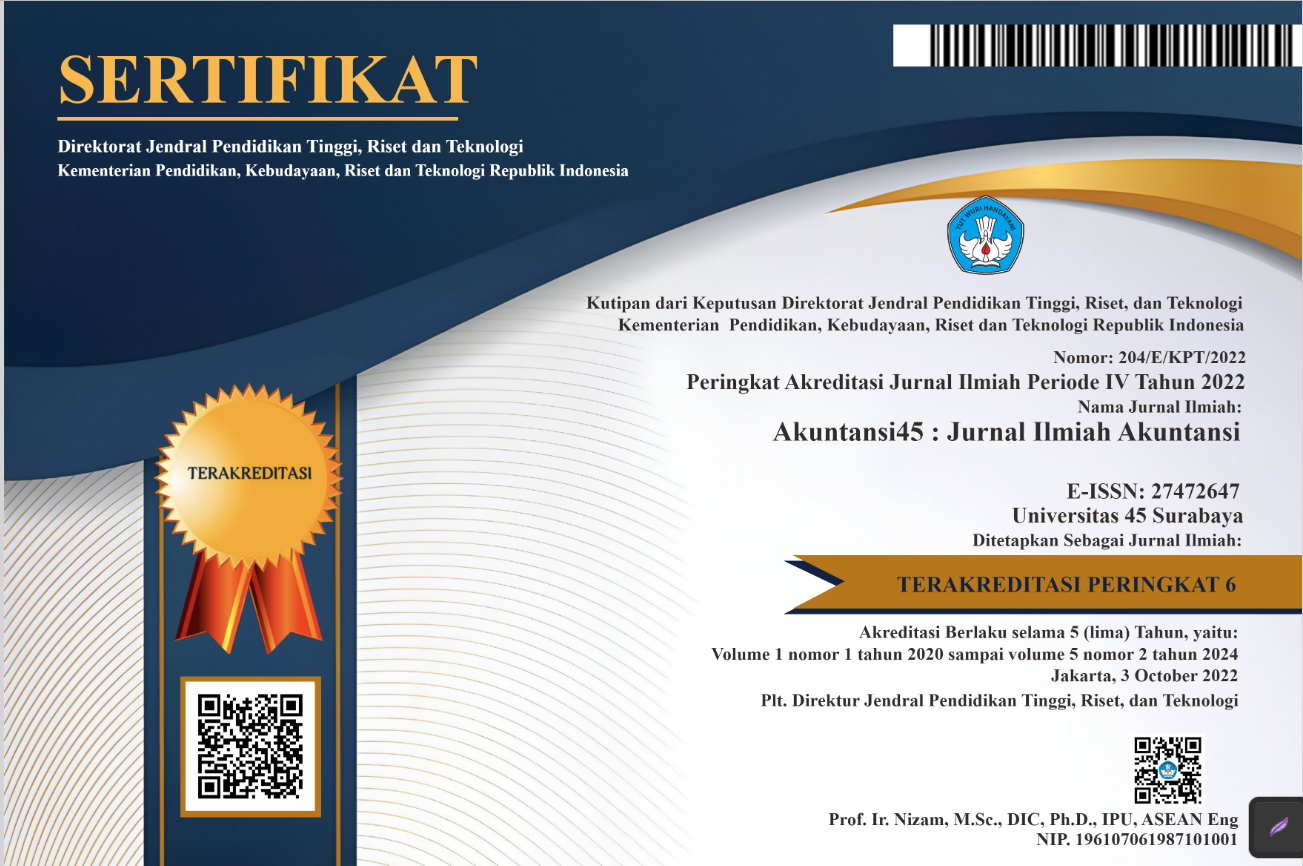Peranan Financial Technology dan Literacy Keuangan Untuk Meningkatkan Kinerja Keuangan UMKM di Wilayah Malang
DOI:
https://doi.org/10.30640/akuntansi45.v5i1.2393Keywords:
Financial technology, literacy financial, control financial, performanceAbstract
The financial performance of key MSMEs is to be improved over time. Financial literacy is a determining factor to directly improve the use of financial technology and financial performance of MSMEs. Financial control moderates the effect of financial technology on financial performance, when MSMEs have strong financial control, optimal use of financial technology will further improve the financial performance of MSMEs. Financial institutions can also prioritise the development of financial literacy and education programmes to support MSME actors in achieving better financial outcomes.
References
Aaron, M., Rivadeneyra, F., & Sohal, S. (2017). Fintech: Is this time different? A framework for assessing risks and opportunities for central banks. In Bank of Canada Staff Discussion Paper (No. 2017–10; Staff Discussion Paper, Vol. 10). https://doi.org/10.34989/sdp-2017-10
Abu-Musa, A. A. (2004). The Criteriafor Selecting Accounting Software: ATheoretical Framework. Paperpresented on Administrative Sciences:Meeting the Challenges of theGlobalization Age, .16.
Adomako, S., Amankwah-Amoah, J., Dankwah, G. O., Danso, A., Donbesuur, F. (2019). Institutional voids, international learning effort and internationalization of emerging market new ventures. Journal of International Management, 25(4), 100666.
Agyapong, D. & Attram, A. (2019). Effect of owner-manager’s financial literacy on the performance of smes in the cape coast metropolis in Ghana. Journal of Global Entrepreneurship Research 9(1): 1–13.
Albashabsheh, A. A. N., Modafar Nayel Alhroob, D., Irbihat, B. E., & Javed, S. (2018). Impact of accounting information system in reducing costs in Jordanian banks. International Journal of Research -granthaalayah.6(7)
Alfartoosi, A, & Jusoh, MA (2021). E-accounting: Mediating effect of Internal Control System on the Relationship Between E-accounting and the Performance in the Small and Medium Enterprises. … Journal of Economics and Management Systems, iaras.org, http://www.iaras.org/iaras/filedownloads/ijems/2021/007-0022(2021).pdf
Alkhawaldeh, B, Alhawamdeh, H, & ... (2023). The effect of financial technology on financial performance in Jordanian SMEs: The role of financial satisfaction. http://m.growingscience.com/beta/uscm/6139-the-effect-of-financial-technology-on-financial-performance-in-jordanian-smes-the-role-of-financial-satisfaction.html
Al-Qudah, G. M. A. (2011). The impact of accounting information systems on the effectiveness of internal control in Jordanian commercial banks "field study". Interdiscip J Contemp Res Bus, 2(9), 365-372
Amankwah‐Amoah, J. (2019). Technological revolution, sustainability, and development in Africa: Overview, emerging issues, and challenges. Sustainable Development, 27(5), 910-922.
Amankwah-Amoah, J., Osabutey, E. L., Egbetokun, A. (2018). Contemporary challenges and opportunities of doing business in Africa: The emerging roles and effects of technologies. Technological Forecasting and Social Change, 131, 171-174.
Ambuehl, S., Bernheim, B. & Lusardi, A. (2015). The effect of financial education on the quality of decision making. Working Paper.
Anas, T., Mangunsong, C., & Panjaitan, N. A. (2017). Indonesian SME Participation in ASEAN Economic Integration. Southeast Asian Economies, 34(1), 77–117. https://doi.org/10.1355/ae34-1d
Anjaningrum, W. D. (2020). Efektivitas Digital Marketing Dan Networks Dalam Mendongkrak Kinerja Pemasaran UKM Di Masa Pandemi Covid-19. SENABISMA: Seminar Nasional Administrasi Bisnis Dan Manajemen, 5(7), 50–61. https://prosiding.polinema.ac.id/senabisma/index.php/senabisma/senabisma2020/paper/viewFile/28/16
Ansori, M. (2019). Perkembangan Dan Dampak Financial Technology (Fintech) Terhadap Industri Keuangan Syariah Di Jawa Tengah. Wahana Islamika: Jurnal Studi Keislaman, 5(1), 32–45. https://doi.org/10.5281/wahanaislamika.v5i1.41
Anzola-Román, P., Bayona-Sáez, C., García-Marco, T. (2018). Organizational innovation, internal R&D and externally sourced innovation practices: Effects on technological innovation outcomes. Journal of Business Research, 91, 233-247.
Arner, D. W., Barberis, J. N., & Buckley, R. P. (2015). The Evolution of Fintech: A New PostCrisis Paradigm? SSRN Electronic Journal. https://doi.org/10.2139/ssrn.2676553
Augustine, B., Bhasi, M., & Madhu, G. (2012). Linking SME performance
forecasting with the and from use of planning findings control: Indian Empirical firms. European Journal of Scientific Research, 73(1), 86-105.
Azar, G., Ciabuschi, F. (2017). Organizational innovation, technological innovation, and export performance: The effects of innovation radicalness and extensiveness. International Business Review, 26(2), 324-336.
Bank Indonesia. (2017). Peraturan Bank Indonesia (PBI) No.19/12/PBI/2017 tentang Penyelenggaraan Teknologi Finansial. In Bank Indonesia (pp. 1–27). Bank Indonesia. https://www.bi.go.id/id/publikasi/peraturan/Pages/pbi_191217.aspx
BFI Finance. (2022). What is Fintech: Definition, Types, List of Legal Fintech 2022. BFI Finance. https://www.bfi.co.id/en/blog/apa-itu-fintech-pengertian-jenis-manfaat-daftar-fintechlegal-2022
Blanco, F. (2017). Cognitive bias in Encyclopedia of Animal Cognition and Behavior. Cham: Springer International Publishing.
Cámara, N. & David, T. (2015). Factors that matter for financial inclusion: Evidence from Peru. AESTIMATIO 9: 8–29.
Camisón, C. Villar-López, A. (2014). Organizational innovation as an enabler of technological innovation capabilities and firm performance. Journal of Business Research, 67(1), 2891-2902.
Castaño, M. S., Méndez, M. T., Galindo, M. Á. (2016). Innovation, internationalization and business-growth expectations among entrepreneurs in the services sector. Journal of Business Research, 69(5), 1690-1695.
Chatterjee, S., Chaudhuri, R., Vrontis, D., & Thrassou, A. (2022). SME entrepreneurship and digitalization – the potentialities and moderating role of demographic factors. Technological Forecasting and Social Change, 179, 121648. https://doi.org/10.1016/j.techfore.2022.121648
Damanpour, F., Aravind, D. (2012). Managerial innovation: Conceptions, processes and antecedents. Management and Organization Review, 8(2), 423-454.
Dewi, M. A. (2020). Dampak Fintech Terhadap Perkembangan Inklusi Keuangan Pada UMKM Di Jawa Timur. Gorontalo Accounting Journal, 3(2), 68. https://doi.org/10.32662/gaj.v3i2.973
Dickerson, M. (2016). Financial scarcity and financial decisionmaking. Arizona Law Review 58: 103
Donbesuur, F, Ampong, GOA, Owusu-Yirenkyi, D. (2020). Technological innovation, organizational innovation and international performance of SMEs: The moderating role of domestic institutional environment. Technological …, Elsevier, https://www.sciencedirect.com/science/article/pii/S0040162520310787
Gerschewski, S., Rose, E. L., Lindsay, V. J., (2015). Understanding the drivers of international performance for born global firms: An integrated perspective. Journal of World Business, 50(3), 558-575.
Grande, E. U., Estébanez, R. P., & Colomina, C. M. (2011). The impact
of Accounting Information Systems (AIS) on performance measures:
Spanish empirical evidence in SMEs. The international journal of
digital accounting research, 11(1577- 8517), 25-43.
Haron, H., Said, S. B., Jayaraman, K., & Ismail, I. (2013). Factors Influencing Small Medium Enterprises (SMES) in Obtaining Loan. International Journal of Business and Social Science, 4(15), 182–195. https://ijbssnet.com/journals/Vol_4_No_15_Special_Issue_November_2013/25.pdf
Ho, L. A. (2011). Mediating, learning organizational innovation and performance. Industrial Management and Data System, 111(1), 113–131.
International Trade Administration. (2016). 2016 Top Markets Report Financial Technology: Overview and Key Findings. In U.S. Department of Commerce. https://legacy.trade.gov/topmarkets/pdf/Financial_Technology_Executive_Summary.pdf
Janita, I., & Chong, W. K. (2013). Barriers of B2B e-Business Adoption in Indonesian SMEs: A Literature Analysis. Procedia Computer Science, 17, 571–578. https://doi.org/10.1016/j.procs.2013.05.073
Kaiser, T. & Menkhoff, L. (2017). Does financial education impact financial literacy and financial behavior, and if so, when? DIW Discussion Papers 1562.
Kaiser, T. & Menkhoff, L. (2017). Does financial education impact financial literacy and financial behavior, and if so, when? DIW Discussion Papers 1562.
Katarachia, A. & Konstantinidis, A. (2014). Financial education and decision making processes. Procedia Economics and Finance 9(14): 142–52.
Khalique, M., Isa, A. H. B. M., Shaari, N., Abdul, J., & Ageel, A. (2011). Challenges faced by small and medium enterprises (SMEs) in Malaysia: An intellectual capital perspective. International Journal of current research, 3(6), 398
Kumala, R., & Junaidi, A. (2020). Strategi Bisnis Dan Pemanfaatan Kebijakan Pajak Di Masa Pandemi COVID-19 Dan Era New Normal (Studi Kasus Pelaku UKM Marketplace). Prosiding Seminar STIAMI, 7(2), 98–103. https://ojs.stiami.ac.id/index.php/PS/article/view/960
Kyläheiko, K., Jantunen, A., Puumalainen, K., Saarenketo, S., Tuppura, A., (2011). Innovation and internationalization as growth strategies: The role of technological and appropriability. International Business Review, 20(5), 508-520. capabilities
Lee, D. & Tsang, E. (2001). The effects of entrepreneurial personality, background and network activities on venture growth. Journal of Management Studies 38(4): 583–602.
Leitner, K. H. (2011). The effect of intellectual capital on product innovativeness in SMEs. International Journal of Technology Management, 53(1), 1–18. https://doi.org/10.1504/IJTM.2011.037235
Liu, B. (2016). Internal Control of Accounting Information System based on Network Environment. In the 2nd International Conference on Electronics, Network, and Computer Engineering (ICENCE 2016). Atlantis Press.
Lusardi, A. & Scheresberg, B. (2013). Financial literacy and high-cost borrowing in the United States. Nber 1–42.
Lusardi, A. (2019). Financial literacy and the need for financial education: Evidence and implications. Swiss Journal of Economics and Statistics 155(1).
Lusardi, A., Mitchell, O. & Curto, V. (2010). Financial literacy among the young: Evidence and implications for consumer policy. Journal of Consumer Affairs 91: 358–80.
Marginingsih, R. (2021). Financial Technology (Fintech) Dalam Inklusi Keuangan Nasional di Masa Pandemi Covid-19. Moneter - Jurnal Akuntansi Dan Keuangan, 8(1), 56–64. https://doi.org/10.31294/moneter.v8i1.9903
Marini, M., Linawati, L., & Putra, R. E. (2020). Peran Fintech terhadap Inklusi Keuangan pada UMKM Tangerang Selatan. Keberlanjutan : Jurnal Manajemen Dan Jurnal Akuntansi, 5(2), 91. https://doi.org/10.32493/keberlanjutan.v5i2.y2020.p91-104
Martini, M., Sardiyo, S., Septian, R., Anggreni sy, D., & Nurdiansyah, D. (2021). Understanding of Financial Literacy as a Moderating Variable on the Effect of Financial Technology on Financial Inclusion in Lubuklinggau City, Indonesia. Journal of Economics, Finance and Accounting Studies, 3(2), 140–151. https://doi.org/10.32996/jefas.2021.3.2.14
Maula, F. I., Murwani, F. D., Hermawan, A., Nasikh, & Wardana, L. W. (2023). Challenges of Business Success in Era of Disruption. Journal of Higher Education Theory and Practice, 23(6), 216–230. https://doi.org/10.33423/jhetp.v23i6.5979
Maula, F. I., Wardana, L. W., & Wibowo, A. (2019). Does Entrepreneurship Education Have Impact on Opening and Maintaining a Garment Business Strategy? Jurnal Entrepreneur Dan Entrepreneurship, 8(2), 46–53. https://doi.org/10.37715/jee.v8i2.1124
Mazlan, A. & Leng, C. (2018). The moderating effect of working capital management on the relationship between working capital determinants and firm performance. Indian-Pacific Journal of Accounting and Finance (IPJAF) 2(1):38–48.
Menike, L.M.C.S. (2018). Effect of financial literacy on firm performance of small and medium enterprises in Sri Lanka. SSRN Electronic Journal 1–25.
Muhammad, M. Z., Char, A. K., Yasoa, M. R. bin, & Hassan, Z. (2009). Small and Medium Enterprises (SMEs) Competing in the Global Business Environment: A Case of Malaysia. International Business Research, 3(1), 66–75. https://doi.org/10.5539/ibr.v3n1p66
Mulasiwi, C. M., & Julialevi, K. O. (2020). Optimalisasi Financial Teknologi (Fintech) terhadap Peningkatan Literasi dan Inklusi Keuangan Usaha Menengah Purwokerto. Performance, 27(1), 12. https://doi.org/10.20884/1.jp.2020.27.1.2284
Musteen, M., Francis, J., Datta, D. K. (2010). The influence of international networks on internationalization speed and performance: A study of Czech SMEs. Journal of World Business, 45(3), 197-205.
Nicolaou, A. I. of (2000). A contingency effectiveness model perceived accounting in information systems: Organizational coordination and control effects. International Journal of Accounting Information Systems, 1(2), 91-105
Nkwabi, J., & Mboya, L. B. (2019). A Review of Factors Affecting the Growth of Small and Medium Enterprises (SMEs) in Tanzania. European Journal of Business and Management, 11(33), 1–8. https://doi.org/10.7176/EJBM/11-33-01
OJK. (2013). Salinan Surat Edaran Otoritas Jasa Keuangan Nomor 30 /Seojk.07/2017. Journal of Chemical Information and Modeling, 53(9), 1689–1699.
Otoritas Jasa Keuangan. (2020). Strategi Nasional Literasi Keuangan Indonesia (SNLKI) 2021 - 2025. In ojk.go.id (p. 378). Otoritas Jasa Keuangan. https://www.ojk.go.id/id/berita-dankegiatan/publikasi/Documents/Pages/Strategi-Nasional-Literasi-Keuangan-Indonesia-2021-2025/StrategiNasionalLiterasiKeuanganIndonesia 2021-2025.pdf
Putra, A. H. (2018). Peran UMKM Dalam Pembangunan dan Kesejahteraan Masyarakat Kabupaten Blora. Jurnal Analisa Sosiologi, 5(2). https://doi.org/10.20961/jas.v5i2.18162
Qamar, J., Farooq, U., Afzal, A. & Akhtar, W. (2016). Determinants of debt financing and their moderating role to leverage-performance relation: An emerging market review. International Journal of Economics and Finance 8(5): 300.
Rahayu, R., & Day, J. (2015). Determinant Factors of E-commerce Adoption by SMEs in Developing Country: Evidence from Indonesia. Procedia - Social and Behavioral Sciences, 195, 142–150. https://doi.org/10.1016/j.sbspro.2015.06.423
Rahmandoust, M., Norouzi, M., Hakimpoor, H. & Khani, N. (2011). Teaching financial literacy to entrepreneurs for sustainable development. OIDA International Journal Of Sustainable Development 02(12).
Remund, D. (2010). Financial literacy explicated: The case for a clearer definition in an increasingly complex economy. Journal of Consumer Affairs 44(2): 276–95.
Remund, D. (2010). Financial literacy explicated: The case for a clearer definition in an increasingly complex economy. Journal of Consumer Affairs 44(2): 276–95.
Ren, S., Eisingerich, A. B., Tsai, H. T. (2015). How do marketing, research and development capabilities, and degree of internationalization synergistically affect the innovation performance of small and medium-sized enterprises (SMEs)? A panel data study of Chinese SMEs. International Business Review, 24(4), 642-651.
Sabri, M. & MacDonald, M. 2010. Savings behavior and financial problems among college students: The role of financial literacy in Malaysia. Crosscultural Communication 6(3): 103-110.
Schniederjans, D. G. (2017). Adoption of 3D-printing technologies in manufacturing: A survey analysis. International Journal of Production Economics, 183, 287-298.
Shafi, M., Liu, J., & Ren, W. (2020). Impact of COVID-19 pandemic on micro, small, and medium-sized Enterprises operating in Pakistan. Research in Globalization, 2, 100018. https://doi.org/10.1016/j.resglo.2020.100018
Sherraden, M.S., & Ansong, D. (2016). (in press). Financial Literacy to Financial Capability: Building Financial Stability and Security. In C. Aprea, K. Breuer, P. Davies, B. Financial Capability and Asset Building for All 26 Working Paper Fuhrman, N. K. Koh, J. S. Lopus, & E. Wuttke (Eds.), International Handbook of Financial Literacy. New York, NY: Springer.
Sisilia, K., Peranginangin, Y., Setyorini, R., & Moeliono, N. (2015). A Framework of Affiliation Partnership between Univesity, SMEs, and Business Sector: A Case Study of PKBL Telkom, Indonesia. Procedia - Social and Behavioral Sciences, 169, 2–12. https://doi.org/10.1016/j.sbspro.2015.01.280
Sohilauw, MI, Nohong, M, & Sylvana, A (2020). The relationship between financial literacy, rational financing decision, and financial performance: An empirical study of small and medium enterprises in Makasar. Jurnal Pengurusan.
Soudani, S. N. (2013). The impact of the implementation of the e accounting
performance system on financial with the effects of internal control systems. Research Journal of Finance and Accounting, 4(11), 17-28.
Srijani, N. K. (2020). Peran UMKM (Usaha Mikro Kecil Menengah) Dalam Meningkatkan Kesejahteraan Masyarakat. EQUILIBRIUM : Jurnal Ilmiah Ekonomi Dan Pembelajarannya, 8(2), 191. https://doi.org/10.25273/equilibrium.v8i2.7118
Sulistiyarini, S. (2012). Pengaruh Minat Individu Terhadap Penggunaan Mobile Banking: Model Kombinasi Technology Acceptance Model (TAM) Dan Theory Of Planned Behavior (TPB). Jurnal Ilmiah Mahasiswa FEB, 1(2), 1689–1699. https://jimfeb.ub.ac.id/index.php/jimfeb/article/view/586
Sunday, A., Turyahebwa, A., Sumil, N., & Byamukama, E. (2010).
Financial performance in the selected micro-finance institutions in Uganda.
Tavor, T. & Garyn-Tal, S. (2016). Risk tolerance and rationality in the case of retirement savings. Studies in Economics and Finance 33(4): 688–703.
Terminology, C. O. (2005). Chartered Institute of Management Accountants. CIMA Publication,1-803
Teru, S. P., Idoku, I., & Ndeyati, J. T. (2017). A Review of the Impact of Accounting Information System for Effective Internal Control on Firm Performance. Indian Journal of Finance and Banking, 1(2), 52-59
Thathsarani, US, & Jianguo, W (2022). Do digital finance and the technology acceptance model strengthen financial inclusion and SME performance?. Information, mdpi.com, https://www.mdpi.com/2078-2489/13/8/390
Trinh, Q. L., Morgan, P. J., & Sonobe, T. (2020). Investment behavior of MSMEs during the downturn periods: Empirical evidence from Vietnam. Emerging Markets Review, 45, 100739. https://doi.org/10.1016/j.ememar.2020.100739
Ulfatun, T., Udhma, U. S., & Dewi, R. S. (2016). Analisis Tingkat Literasi Keuangan Mahasiswa Fakultas Ekonomi Universitas Negeri Yogyakarta Tahun Angkatan 2012-2014. Pelita, XI(2), 1–13. https://journal.uny.ac.id/index.php/pelita/article/view/10924
Wardana, L. W., Ahmad, Indrawati, A., Maula, F. I., Mahendra, A. M., Fatihin, M. K., Rahma, A., Nafisa, A. F., Putri, A. A., & Narmaditya, B. S. (2023). Do digital literacy and business sustainability matter for creative economy? The role of entrepreneurial attitude. Heliyon, 9(1), e12763. https://doi.org/10.1016/j.heliyon.2022.e12763
Wong, C. Y., Goh, K. L. (2015). Catch-up models of science and technology: A theorization of the Asian experience from bi-logistic growth trajectories. Technological Forecasting and Social Change, 95, 312-327.
Wu, J., Wang, C., Hong, J., Piperopoulos, P., Zhuo, S., (2016). Internationalization and innovation performance of emerging market enterprises: The role of host-country institutional development. Journal of World Business, 51(2), 251-263.
Yang, L.; Zhang, Y. [2020]. Digital Financial Inclusion and Sustainable Growth of Small and Micro Enterprises—Evidence Based on China’s New Third Board Market Listed Companies. Sustainability, 12, 3733.
Downloads
Published
How to Cite
Issue
Section
License
Copyright (c) 2024 Djoewita Djoewita, Puji Handayati, Satia Nur Maharani

This work is licensed under a Creative Commons Attribution-ShareAlike 4.0 International License.









